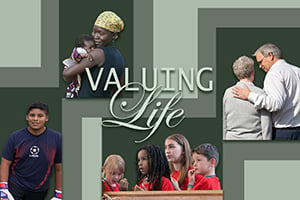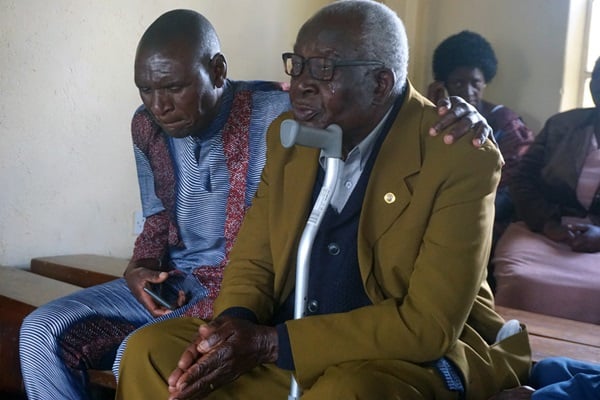Jesus said, “I came so that they could have life — indeed, so that they could live life to the fullest” (John 10:10, CEB).
United Methodists believe every human life is important because God has created us all in God’s image and loves us.
United Methodists also recognize that every human life comes to an end -- an end that can happen at any point during life, from a wide variety of causes. Whether through miscarriage, infant mortality, accidents, violence by individuals, government policies, acts of war, disease that cuts life short, or irrecoverable decline after many years of living, all of us will die.
And whenever those known to us die, we confess in the words of a ninth century prayer that opens the service of Committal, “In the midst of life, we are in death.”
And we grieve.
Where is the promise of life to the fullest as we face death and experience grief?
It is in the loving care we offer those who are dying and in the listening ears we offer to those who speak or cry out about what is killing them and their people. It is in the advocacy we offer to redress death-dealing wrongs and in the journeys we take alongside all who grieve, whatever the cause, whenever it happens in their lives.
And it is in our grief itself. Grief is our response when one we love can no longer receive our love.
Care for the dying and grieving
As our Social Principles remind, “Care for dying persons is part of our stewardship of the divine gift of life when cure is no longer possible.” Often, care for these persons involves letting go of attempts to cure, accepting that death will come, and doing what we can to help our loved ones feel as comfortable and aware as possible. While not taking steps to hasten their deaths, we also no longer take steps to prolong their lives. We care enough for them to let them die with as much dignity as possible.
Learn more

Again, our Social Principles remind us of Christ’s promise: “Even when one accepts the inevitability of death, the Church and society must continue to provide faithful care, including pain relief, companionship, support, and spiritual nurture for the dying person in the hard work of preparing for death.”
When we face death and grief, we can choose not to focus on what we lose. We can focus instead on providing faithful care, ensuring pain relief is available, being present as we can, and offering support and spiritual nurture, especially the assurance of our hope of resurrection through the salvation offered us in Jesus Christ.
As congregations, we want to ensure we have ministries in place beyond the pastor to provide care, connect people to health care resources (including hospice), be present, and offer support and nurturing care. These may include teams to host funeral gatherings or send food to loved ones, trainings on caring for the dying, grief support groups, support for legal and financial counsel, and respite care for those caring for dying loved ones, among others.
Many United Methodist congregations these ministries in place. Those who may not have the capacity to do all of these themselves regularly partner with those who do to ensure that all who go through the experience of death and grief have the abundant life support they need.
Advocacy for the dying and grieving
While the Social Principles call United Methodists to express Christ’s promise of abundant life through acts of care, the Book of Resolutions also calls United Methodists to do so through advocacy.
“Faithful Care for Persons Suffering and Dying” calls United Methodists to advocate for “comprehensive physical, social, emotional, and spiritual care needed by those facing grave illness and death.” Though hospice care has become more widely available over the years, much of the physical and social care for people who are dying and their caregivers, including respite care, remains unaffordable, uncovered by insurance, or simply unavailable.
“Native People and The United Methodist Church” commits United Methodists who are not Native, First Nations, or Indigenous Peoples in their countries to listen and advocate in response to the “historic grief and trauma” Native people have experienced at the hands of those who colonized their land. This grief is often in response to acts of genocide that have had generational effects and is ongoing. Advocacy, not just listening, is essential to move through it. Advocacy includes legal support by the United Methodist Board of Church and Society for cases where American Indian religious rights continue to be violated in spite of the guarantees of the American Indian Religious Freedom Act (1978, updated 1994 and 1996).
In addition to walking with and providing spiritual support for families in “the process of grieving and healing” from deaths caused by gun violence, “Our Call to End Gun Violence” urges United Methodists to take and work for actions that reduce gun violence, and thus the rates of death and grief. These include but not limited to “universal background checks on all gun purchases, ensuring that all guns are sold through licensed gun retailers … and banning large-capacity ammunition magazines and weapons.”
In all of these ways, United Methodists experience and express Jesus’ promise of abundant life in the face of death and grief -- life that acknowledges the reality but not the finality of death, life that embraces all throughout life and death, life that overcomes death's destructive power now and eliminates it in the age to come.
This content was produced by Ask The UMC, a ministry of United Methodist Communications.





